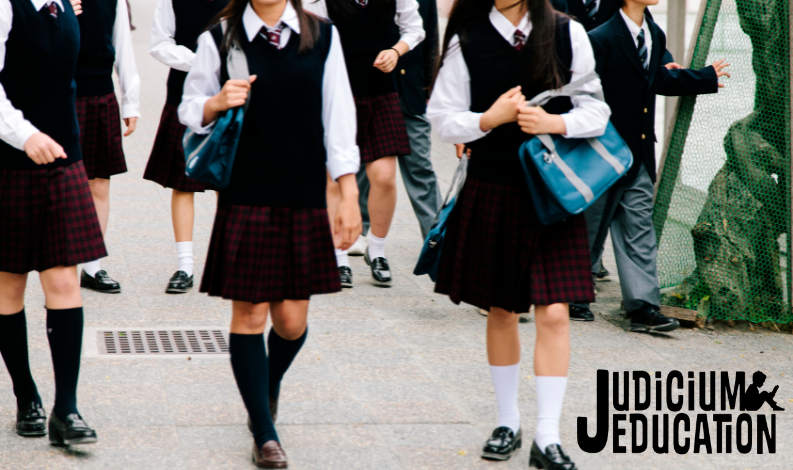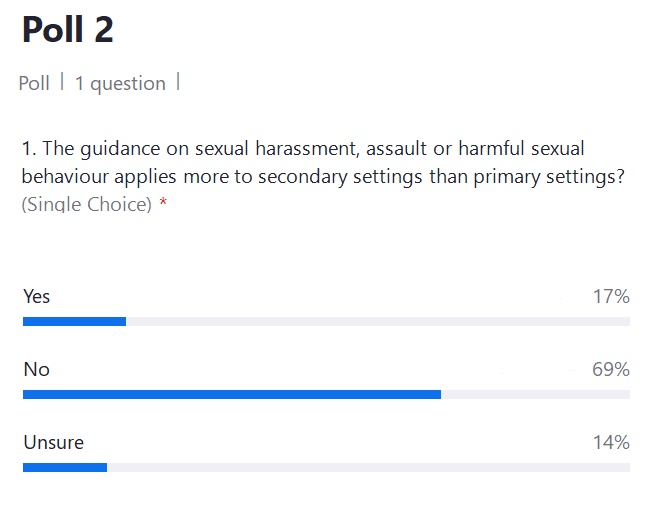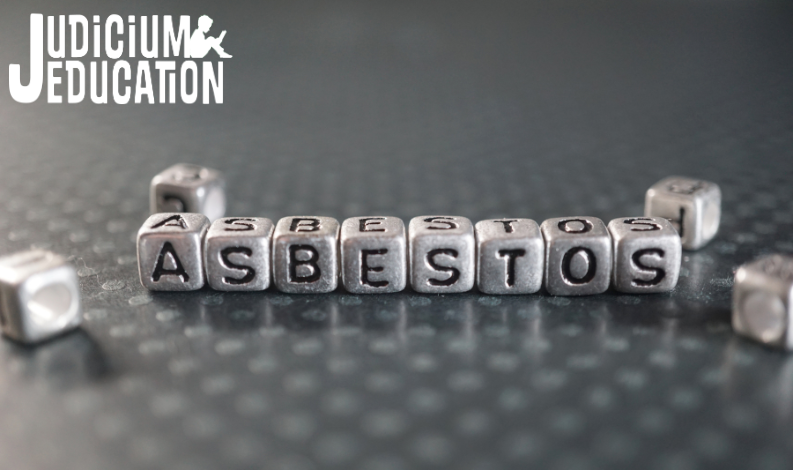
Safeguarding: Sexual Harassment in Schools Two Years on from Everyone's Invited
subscribing to our newsletter
This blog is based on Judicium’s Safeguarding ‘Sofa Session’ from the 28th of March, with our resident expert Helen King. This session focused on reviewing what has shaped guidance since March 2021 and the lessons learned; part five of Keeping Children Safe in Education and what this means for schools practically; considering next steps to further strengthen your response to incidents of sexual harassment and violence; and how to build and maintain a culture of vigilance within schools.
Reviewing What has Shaped Guidance since March 2021 and What Lessons have been Learned
Background:
In March 2021 the news was filled with a website known as Everyone’s Invited where people could post testimonies of sexual harassment or violence whilst at school.
In addition, it was also a month which saw the murder of Sarah Everard by a police officer whilst she walked home.
The two events demonstrated that people, particularly women, do not feel and are not always safe from sexual assault and harassment and this was manifesting in schools too.
On 31 March 2021, Ofsted were asked to undertake an immediate review into sexual abuse across state and independent schools. Ofsted visited 32 schools and colleges and spoke to over 900 children and young people about their experiences. This information was published on 10 June 2021.
Key Findings
These were the recommendations for schools and college leaders:- A carefully sequenced RSHE curriculum, based on the DfE’s statutory guidance, that specifically includes sexual harassment and sexual violence, including online.
- This should include time for discussing difficult topics, such as consent and the sending of nudes.
- High-quality training for teachers delivering RSHE.
- Routine record-keeping and analysis of sexual harassment and sexual violence, including online, to identify patterns and intervene early to prevent abuse.
- A behavioural approach, including sanctions where appropriate, to reinforce a culture where sexual harassment and online sexual abuse are not tolerated.
- Working closely with local safeguarding partners to be aware of the range of support available to children and young people.
- Support for DSLs to engage with Local Safeguarding Partners.
- Training to ensure staff (and governors, where relevant) are able to:
- Better understand the definitions of sexual harassment and sexual violence, including online sexual abuse
- Identify the early signs of child-on-child sexual abuse
- Consistently uphold standards in their responses to sexual harassment and online sexual abuse
In September 2021 new guidance was published on Sexual Violence and Sexual Harassment between children in schools and colleges to strengthen the role and guidance for schools.
In September 2022 this was merged into Part Five of Keeping Children Safe in Education.
This continues to be a line of enquiry in Ofsted inspections with records and analysis of sexual harassment and violence data being requested.
Polls
.jpg)

Part Five of Keeping Children Safe in Education and What it Means for Schools or Trusts in Practice
What should schools expect from their staff?
- All staff should have an attitude of ‘it could happen here’.
- The school should have a zero-tolerance approach to sexual violence and sexual harassment and that it is never acceptable.
- Importantly, staff need to be aligned with this and should challenge behaviour and not dismiss reports of behaviour. NB: This is as important for primary schools as secondary school.
- What constitutes sexual violence e.g., Sexual Offences Act 2003: rape, assault by penetration, sexual assault or causing someone to engage in sexual activity without consent.
- It states on p105 of KCSIE that schools should be aware that sexual assault covers a very wide range of behaviour so a single act of kissing without consent or touching someone’s bottom/ breasts/ genitals without consent, can still constitute sexual assault.
- Your school understands what can constitute sexual harassment e.g., sexual remarks about clothes, using sexualised names, sexual jokes, taunting or lewd comments, some physical behaviour like deliberately brushing against someone. NB: This can take place online too.
- Staff should know that if it isn’t challenged, it can normalise inappropriate or harmful behaviour.
- What is harmful sexual behaviour.
- Have training or lessons been conducted to equip staff and students with what constitutes harmful sexual behaviour: developmentally expected, to inappropriate, problematic, abusive and violent.
Recommendations:
- Consider quizzing staff knowledge on these technical definitions and use the results to clarify any misconceptions.
- This will support with accurate identification and recording of incidents and support with a culture of vigilance to harmful sexual behaviour and intervening as early as possible.
- Consider the RSE curriculum and what knowledge students are exposed to at what age.
- Ensure they are equipped to explain if they have been harmed and understand what inappropriate, problematic, abusive or violent behaviour looks like and how to report it.
- Ensure the whole school community understands how to report incidents.
- For example, that incidents must be reported to the DSL as a safeguarding matter irrespective of whether behaviour sanctions are being applied or considered too.
- They should also have a clear sense of the school response.
How should your school or Trust respond to incidents?
KCSIE says that systems should be in place for children to confidently report abuse, knowing their concerns will be treated seriously. This should be widely promoted and easily accessible.
- Schools or Trusts should strategize the response at leadership level. Pre-planning and effective training can support a considered and appropriate response.
- If this has already taken place, review by evaluating your response to incidents of harmful sexual behaviour.
- Some cases can be complex so consider reviewing such incidents after they occur for lessons learned to support with improving your response.
Key points to consider in your review (based on a summary of part five):
- Was the victim assured that they were being taken seriously?
- Did two members of staff manage the report (preferably one being the DSL)
- Were nudes and semi-nudes involved and was this dealt with in line with the UKCIS guidance?
- Who did the child disclose to and the substance of that conversation, ensuring confidentiality wasn’t promised?
- Was the written record substantial and recording the facts as the child presents them?
- When was the DSL or deputy DSL informed?
- What further steps were decided upon and whether external agencies were considered? Is this rationale clearly documented?
- How did the school seek the victim’s wishes and navigate this when informing parents or external agencies?
- Was a risk assessment put in place?
- NB: For sexual violence a RA should always be put in place. For sexual harassment we would suggest one where any safety planning takes place. For those who use our service we have a model RA
- Does the child have a sibling in the school and was necessary support considered?
- What support was given to both the victim and the perpetrator?
- What ongoing support is provided to them and how often is this reviewed?
- Do your records include all concerns, discussions, decisions and reasons for decisions?
Considering Next Steps to Strengthen your Response to ncidents of Sexual Harassment and Violence
Analyse your data and consider your trends.
Who does your data support analysis?
Consider what you are reporting on and by who, as the more complete from the beginning, the more you can do with the information. Most electronic record-keeping systems have these functions in place, but we often see these function underutilised in schools.
Analysis Points
- Do incidents mostly take place online, on site or offsite but in person?
- Are incidents more prevalent in certain year groups? Do you need to bring some topics earlier in RSE based on this?
- Do similar forms of harmful sexual behaviour continue to appear? Can you engage parents with this data and use them to support in challenging it?
- Are certain groups more vulnerable?
Some important areas to cover within your data set are age and year group of child; SEND needs; gender; and the location of the incident.
This data set coupled with reviewing of incidents can be a powerful tool in evaluating incidents in your context and moving your response from being reactive to proactive and strategic. This supports in building a whole-school culture of vigilance.
How to Build and Maintain a Culture of Vigilance within Schools
Areas to consider:
Student Voice:- A student survey on the prevalence and understanding of harmful sexual behaviour, sexual harassment and sexual violence where you can categorise responses based on gender and year group.
- You want to get a sense of their experience of it (both online and offline), their knowledge of what it constitutes, their understanding of how to report concerns.
- An example of a question you may like to ask primary aged pupils is, “Do you think you could talk to an adult at school if something was worrying you?”
- An example of a question you may like to ask secondary pupils is “Do you think the school challenges sexism?”
- Feedback on RSE lessons and what they would like to have more of.
- Working with the student council or having a student working group to consider the school approach.
NB: At Judicium, as a part of our audits, we speak to students about their experiences of this at school in an age-appropriate manner.
Parent Involvement:
- Parent forums on what the RSE curriculum looks like, why you cover what you cover when you do, the importance of it based on the data set of issues in school and what they can do to support.
Teacher Involvement:
Staff training for RSE is paramount.
Your school should have had your new curriculum in place for RSE under the government guidance for at least a full academic year.
If you have non-specialists teaching this topic you should consider the following:
- Curriculum planning and support with adaptation by a curriculum specialist.
- Staff training and support in delivering lessons including things like deliberate practice to support successful delivery.
- Learning walks or student and staff voice/feedback to get a sense of the success of the curriculum and whether it needs to be adapted further.
- Considering a means of evaluating student knowledge at the end of the unit.
- RSE tends to be structured differently to more traditional and examinable subjects but think whether it is worthwhile gathering information from quizzes on what they have learned to support with refinement and sequencing of the curriculum for later years.
All staff:
- Do they feel confident in responding to reports? Have you considered scenario training with them?
- Do they know what the process is within your school for responding to incidents?
- Do staff understand why they need to be vigilant when it comes to safeguarding concerns?
- Do they feel concerns are dealt with well and there is a strong culture around challenging harmful sexual behaviours? How do you know and what are their views on improving this?
You can follow us on Twitter: @JudiciumSG @JudiciumEDU
Safeguarding eLearning Courses
The Safeguarding Service is hosting live, virtual training courses this term. Upcoming courses, dates and links to book are below:
Safer Recruitment Training - 8th June 2023
If you’d like to review Judicium’s forthcoming sofa sessions please click here
© This content is the exclusive property of Judicium Education. The works are intended to provide an overview of the sofa session you attend and/or to be a learning aid to assist you and your school. However, any redistribution or reproduction of part or all of the contents in any form is prohibited. You may not, except with our express written permission, distribute or exploit the content. Failure to follow this guidance may result in Judicium either preventing you with access to our sessions and/or follow up content.
Related content
.png)
This blog is based on Judicium’s Safeguarding ‘Sofa Session’ from the 25 April with our resident expert Sarah Cook.

This blog is based on Judicium’s Health and Safety ‘Sofa Session’ from the 24th of April, with our resident expert Marta Zydel.

This summary is based on Judicium’s Employment Law ‘Sofa Session’ from the 17th of April, with our resident expert Paul Luffman LLB (Hons), L.P.C.
.png)
This is a summary taken from Judicium’s DPO ‘Sofa Session’ from the 20th of March with Data Services Consultant Patrick Ballantine.
.png)
This blog is based on Judicium’s Health and Safety ‘Sofa Session’ from the 14th of March, with our resident expert Jamie Ashard, LLB (Hons), GradIOSH, DipNCRQ.
This blog is based on Judicium’s Safeguarding ‘Sofa Session’ from the 13th of March, with our resident expert Joanne Bocko.


Sofa Sessions | Safeguarding